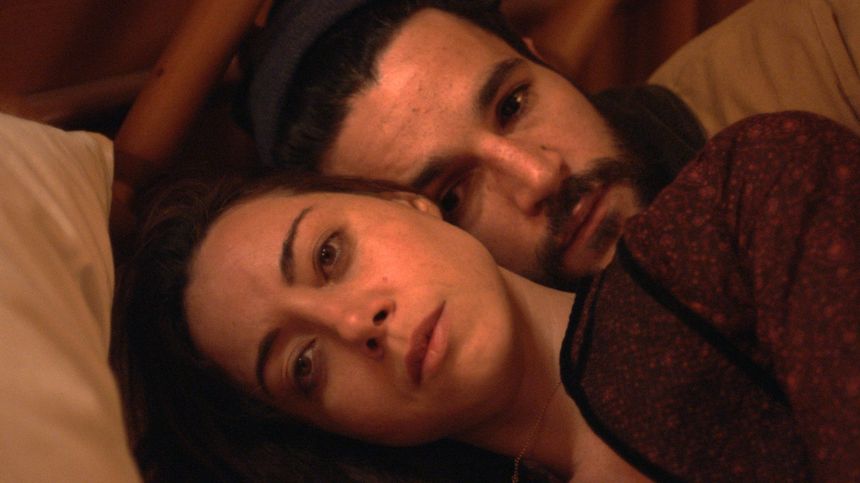Melbourne 2020 Review: BLACK BEAR, a Gaslight Meta Nightmare
Lawrence Michael Levine’s debut feature is also Aubrey Plaza’s best performance yet.

Black Bear could be a Hitchcock inspired-indie thriller that opens with actor--director-writer Allison (Aubrey Plaza), collecting her towel from a lake’s small dock, making her way inside a cabin where she sits, notebook and pen at the ready; a title card reads Part one. Things happen. Later another title card, the same lake scene before it, suddenly Part Two. Different things happen, however the same people now play different roles. The film concludes with credits, but did it ever begin?
Black Bear could be a Lynchian nightmare (think, Mulholland Drive), reality cannot be properly distinguished. The aforementioned title card structure will become a very important thing to ponder, it is perhaps the key to understanding, along with the sounds and sight of a black bear which are both intentionally distinct. Black Bear challenges conventional notions of narrative framing and thematic structure, initially utilising indie film psychological thriller-drama tropes yet completely upending them. It is a critique of the wave of heady psychological lower budget films that wow with cleverness. Black Bear is designed to discomfort and not please the viewer, it is framed in such a way as to never know the whole story.
Part one is an encroaching of repressive fears explored as inebriated conversation turned interrogation. Passive aggressive quips exchanged between partner duo Blair (Sarah Gadon) and Gabe (Christopher Abbott) makes Allison (and us) feel uncomfortable, and awkward. Blair is pregnant, but Gabe is hitting it off with Allison, she is renting a room in his mother’s forest property-turned writers retreat. Allison needs inspiration for her next film, but is instead faced with a jealous disdain that seems to spiral out of control as the evening progresses, much like an Alex Ross Perry (Queen of Earth) film.
There is an instantly fascinating dynamic to these wooden characters; something seems wrong, out of place, not quite reality. Blair is drunk, but is pregnant and should not be drinking, she is intentionally confrontational and difficult. This leads to an elongated argumentative debate about progressive values and ultimately self-confessed nihilism from Gabe who is deeply unhappy. The build-up of dread and anxiety is palpable, but there is something lurking under the surface, or above it, the rustling in the leaves, the sound of a bear.
Part two is about to begin, as things escalate to where we think it is going to. Suddenly we are back at the introduction, this time for part two. While the first part used its tense buildup to express a complex breakdown of a relationship, the second part presents an entirely different viewpoint of these three characters. Here they are presented as members of cast and crew; actors uniquely interrelated in a way that is hard to explain without spoiling. The scope of what is happening in the second part changes how the film is, genre and otherwise. This horror tension is replaced by a blackly comic exploration of the minutiae of this new dynamic. This is explored in a fresh and interesting way on a film set, not unlike a Mamet play (State and Main) Ironically strange things begin to happen too, coffee spills repeat in an artificial slapstick way, mundane things feel meaningful in this context, new relationships are shown. There is still something horrific happening in Black Bear.
The mentioning of Directors peppered throughout this review is inherently intentional to the piece of work that Black Bear is. This is a meta-textual analysis of the industry, a snapshot of a toxic scenario and a sour relationship that is bitterly exploited via gaslighting (no matter the context) to enliven the adage of suffering for one’s art beyond genre definition or acting instruction. Is Aubrey Plaza acting as Allison, or is Allison an actor for something else entirely? In Black Bear Aubrey takes advantage of her deadpan style to perfect effect, but brings a new range of trauma, breakdown and anxious despair that although brilliant, is genuinely unsettling and uncomfortable to witness. Some scenes of her anguish are frankly painful, but this does not matter. The film is a puzzle, the controlling relationship and power dynamics are one part of it, as broader and more essential questions remain as to what exactly Black Bear is.
The ending of Black Bear is initially deeply unsatisfying, but upon reflection the subtle (and literal) nod to the layers this film tries to delve into actually seem to implicate us, the audience, as well. Black Bear is a trip, and designed for post-film conversation and theorizing. Although it leaves a slightly bad taste due to its depictions of gaslighting, Black Bear is thought provoking days after viewing, and in the words of Aubrey Plaza "get ready, Black Bear is a nightmare of a film".
Black Bear is screening as part of the online-only edition of MIFF. Book now to avoid missing out. The streaming fest runs 6th-23rd August Australia-wide.







